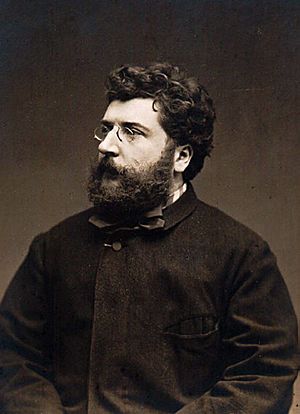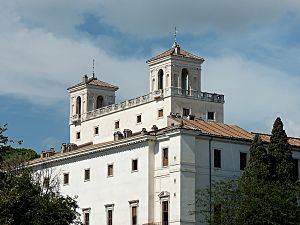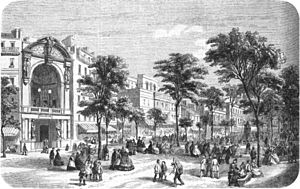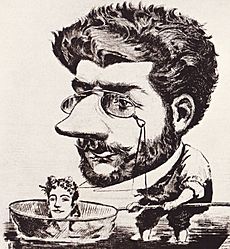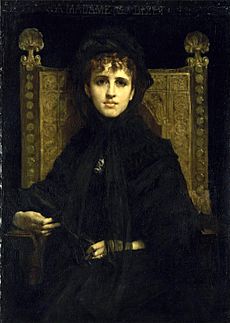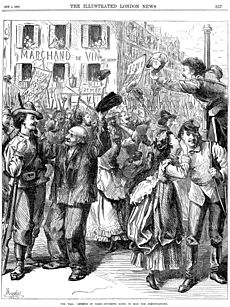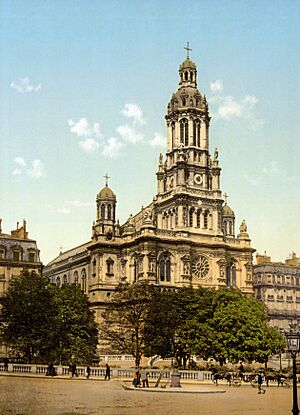Georges Bizet facts for kids
Georges Bizet (born Alexandre César Léopold Bizet; October 25, 1838 – June 3, 1875) was a French composer. He lived during the Romantic era of music. Bizet is most famous for his operas, especially Carmen. This opera became one of the most popular and often performed operas ever, even though Bizet died shortly after its first show.
Bizet had a brilliant student career at the Conservatoire de Paris, a famous music school. He won many awards, including the important Prix de Rome in 1857. He was also an amazing pianist. But he chose not to perform much in public. After living in Italy for almost three years, he returned to Paris. He found that the main opera houses preferred older, well-known works. They were not very interested in new music from young composers like him.
His other music, like pieces for piano and orchestra, was mostly ignored. So, he often made a living by arranging music for other people. He started many theater projects in the 1860s, but most were never finished. Two of his operas, Les pêcheurs de perles and La jolie fille de Perth, were not immediate hits.
After the Franco-Prussian War (1870–1871), Bizet had little success with his short opera Djamileh. However, an orchestral suite he made from his music for the play L'Arlésienne became very popular. His last opera, Carmen, was delayed because people worried its themes of betrayal and murder would upset audiences. After its first performance on March 3, 1875, Bizet thought it was a failure. He died of a heart attack three months later. He never knew that Carmen would become a huge and lasting success.
Bizet married Geneviève Halévy, and they had one son. After his death, most of his music, except Carmen, was forgotten for a while. Many of his original music papers were lost or given away. Published versions of his works were often changed by others. He did not create a new style of music or have clear students. But in the 20th century, people started performing his works more often. Today, many experts see him as a brilliant and original composer. His early death was a big loss for French music.
Contents
Bizet's Early Life and Music Training
Family Background and Childhood
Georges Bizet was born in Paris on October 25, 1838. His birth name was Alexandre César Léopold. But he was baptized "Georges" and used that name his whole life. His father, Adolphe Bizet, was a singing teacher. His mother, Aimée Delsarte, was a talented pianist. Her family was very musical. Georges was their only child.
Georges showed a talent for music very early. He quickly learned music notes from his mother. He could sing difficult songs from memory. He also understood complex musical chords. His parents saw his talent. They decided he was ready for the Conservatoire de Paris, a famous music school. He was only nine, but the usual entry age was ten. A horn player named Joseph Meifred was so impressed by Georges's skills that he let him in early.
Studying at the Conservatoire
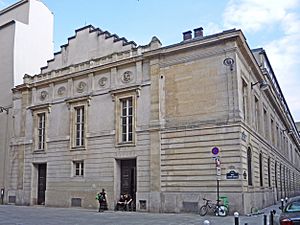
Bizet joined the Conservatoire on October 9, 1848. He made a strong impression right away. Within six months, he won first prize in solfège (music reading). This impressed Pierre-Joseph-Guillaume Zimmerman, a former piano professor. Zimmerman gave Bizet private lessons in counterpoint and fugue. Through these lessons, Bizet met Zimmerman's son-in-law, the composer Charles Gounod. Gounod greatly influenced Bizet's music style. Bizet also met Camille Saint-Saëns, who became a close friend.
Bizet's piano skills grew fast under Antoine François Marmontel, his piano professor. He won second prize for piano in 1851 and first prize in 1852. Bizet later told Marmontel that his class taught him more than just piano; it taught him to be a musician.
Bizet's first known songs were written around 1850. In 1853, he joined Fromental Halévy's composition class. His music became more complex and better. Two of his songs were published in 1854. In 1855, he wrote a big orchestral piece. He also made piano versions of two of Gounod's works. Bizet's work on Gounod's symphony inspired him to write his own. This was his Symphony in C. It was very similar to Gounod's in some parts. Bizet never published it, and it was only found and performed in the 1930s.
In 1856, Bizet tried for the important Prix de Rome award. He didn't win that year. But then he entered an opera competition organized by Jacques Offenbach. The challenge was to set the music for a one-act opera called Le docteur Miracle. Bizet shared the prize with another composer. Because of this success, Bizet often visited Offenbach's parties. There, he met the famous composer Gioachino Rossini. Bizet greatly admired Rossini's music.
For his 1857 Prix de Rome entry, Bizet chose to set a cantata (a vocal piece) called Clovis et Clotilde. He won the prize! This award gave him money for five years. He had to spend the first two years in Rome, the third in Germany, and the last two in Paris. Each year, he also had to send in an original piece of music. Before he left for Rome, his prize-winning cantata was performed and received well.
Time in Rome and Return to Paris
Life in Rome (1858–1860)
Bizet arrived at the Villa Medici in Rome on January 27, 1858. This palace was home to the French Académie in Rome. He called it "paradise." The villa offered a great place for artists to work. Bizet enjoyed the social life there. In his first six months, he only wrote a Te Deum for a competition. This piece did not impress the judges. Bizet was so disappointed that he promised not to write religious music again. His Te Deum was forgotten until 1971.
For his first required piece from Rome, Bizet wrote an opera buffa (comic opera) called Don Procopio. He was supposed to write a mass, but he didn't want to write religious music. The Académie liked Don Procopio. They praised his "easy and brilliant touch."
Bizet often started big projects in Rome but then dropped them. He considered at least five opera projects and two symphonies, but didn't finish them. After Don Procopio, he only completed one more work in Rome. This was a symphonic poem called Vasco da Gama. It was well-received but soon forgotten.
In 1859, Bizet traveled around Italy. He visited Naples and Pompeii. He loved Pompeii, saying, "Here you live with the ancients." He started sketching a symphony based on his Italian travels. This project later became his Roma symphony, finished in 1868. In September 1860, while in Venice, Bizet learned his mother was very ill. He quickly returned home to Paris.
Starting a Career in Paris (1860–1863)
Back in Paris, Bizet still had two years of his award money. This gave him some financial security. Young composers faced challenges in Paris. The two main opera houses, the Opéra and the Opéra-Comique, mostly performed older works. New French composers had little chance. The best hope for new operas was the Théâtre Lyrique company. This company had staged successful works by Gounod and Berlioz.
In March 1861, Bizet saw the Paris premiere of Wagner's opera Tannhäuser. The audience rioted. But Bizet changed his mind about Wagner's music, which he had thought was strange. He now called Wagner "above and beyond all living composers." After this, people often accused Bizet of being too much like Wagner.
Bizet was a very skilled pianist. In May 1861, he showed his talent at a dinner party with Franz Liszt. Bizet played one of Liszt's hardest pieces perfectly without practice. Liszt said, "I thought there were only two men able to surmount the difficulties... there are three, and... the youngest is perhaps the boldest and most brilliant."
Bizet's third required piece for the Prix de Rome was delayed. His mother was sick for a long time and died in September 1861. He finally sent in three orchestral works: an overture, a scherzo, and a funeral march. The overture is lost. The scherzo was used in his Roma symphony. The funeral march music was used in a later opera.
His last required piece was a one-act opera, La guzla de l'émir. The Opéra-Comique had to stage works by Prix de Rome winners. So, La guzla began rehearsals in 1863. But in April, Bizet got an offer to compose a three-act opera. This was Les pêcheurs de perles. A condition was that this opera had to be his first publicly staged work. So, Bizet quickly pulled La guzla from production. He used some of its music in the new opera. Les pêcheurs de perles premiered on September 30, 1863. Critics were mostly negative. But Berlioz praised it. The public wasn't very interested, and it ran for only 18 shows. It wasn't performed again until 1886.
Struggles and Marriage
Years of Hard Work
When his Prix de Rome money ran out, Bizet found it hard to make a living from his music. He taught piano and composition. He also worked as an accompanist for rehearsals. But his main work was arranging other people's music. He made piano versions of hundreds of operas and other pieces. He also prepared vocal scores and orchestral arrangements. For a short time, he was a music critic for a magazine.
Since 1862, Bizet had been working on Ivan IV, an opera about Ivan the Terrible. But it was never produced. In 1865, he offered it to the Opéra, but they rejected it. It wasn't performed until 1946. In 1866, Bizet signed another contract for La jolie fille de Perth. Its story was very weak. Problems delayed its premiere until December 26, 1867. Critics liked it more than his other operas. But money problems meant it only ran for 18 shows.
While working on La jolie fille, Bizet also contributed to a four-act operetta called Marlbrough s'en va-t-en guerre. His part was very successful. Bizet also finished his Roma symphony and wrote many piano pieces and songs. But this time was full of disappointments. Several opera projects were abandoned. He entered competitions but didn't win. His Roma symphony was performed in 1869. Bizet said it was a success based on the mix of applause and boos.
Bizet's Marriage
After his old teacher Fromental Halévy died in 1862, Bizet was asked to finish Halévy's opera Noé. He stayed friends with the Halévy family. Fromental had two daughters. The younger one was Geneviève. It's not clear when Bizet and Geneviève fell in love. But in October 1867, he said he had met an "adorable girl" he loved and would marry. They got engaged, but her family at first didn't approve. Bizet said they thought he was "penniless, left-wing, anti-religious and Bohemian." But by summer 1869, their objections were gone. The wedding was on June 3, 1869.
Bizet finished Noé as a tribute to his father-in-law. But it was never produced. Bizet's marriage was happy at first. But Geneviève had nervous problems, and her mother interfered. Despite this, Bizet got along well with his mother-in-law. In the year after his marriage, he planned many new operas. He started music for two: Clarissa Harlowe and Grisélidis. But his work stopped in July 1870 when the Franco-Prussian War began.
War, Upheaval, and Final Works
War and Changes
France declared war on Prussia on July 15, 1870. Bizet joined the National Guard. He complained about the old weapons. France suffered big defeats. Emperor Napoleon III was captured, and the Second Empire ended.
Bizet was happy when the Third Republic was announced in Paris. Prussian armies surrounded Paris by September 17. Bizet refused to leave the city, calling it "cowardice." Life in the city became very hard.
An armistice was signed in January 1871. But then there was civil unrest in Paris. The city's government was taken over by the Paris Commune. Bizet and Geneviève left Paris for safety. They stayed in Le Vésinet, hearing the sounds of fighting as government troops crushed the uprising.
Later Career and Carmen
In June 1871, Bizet was supposed to become chorus-master at the Opéra. But he didn't take the job. He went back to working on Clarissa Harlowe and Grisélidis, but neither was finished. His other completed works in 1871 were a piano duet called Jeux d'enfants and a one-act opera, Djamileh. Djamileh opened in May 1872. It was poorly performed and closed after only 11 shows. On July 10, Geneviève gave birth to their only child, a son named Jacques.
Bizet's next big job was for Alphonse Daudet's play L'Arlésienne. When the play opened, critics found the music too complex. But Bizet made a four-movement suite from the music. It was performed in November and was a big success.
In June 1872, Bizet was asked to compose a three-act opera for the Opéra-Comique. The story chosen was Prosper Mérimée's short novel, Carmen. Bizet started the music in 1873. But the Opéra-Comique worried about the story's themes. So, work stopped. Bizet then began Don Rodrigue, an opera based on the El Cid story. But the Opéra building burned down in October. Don Rodrigue was put aside and never finished. Bizet later used a theme from it for his 1875 overture, Patrie.
The co-director of the Opéra-Comique who opposed Carmen resigned in early 1874. This removed the main obstacle. Bizet finished the score that summer. He was happy with it, calling it "all clarity and vivacity, full of colour and melody." The famous singer Célestine Galli-Marié was chosen for the main role.
When rehearsals began in October 1874, the orchestra found parts of the music hard. The chorus also struggled. Bizet had to fight against attempts to change parts of the story that were seen as improper. The first performance was delayed until March 3, 1875. On that morning, Bizet was also made a Chevalier of the Legion of Honour.
Many famous musicians were at the premiere, including Jules Massenet and Camille Saint-Saëns. The opera lasted four and a half hours. Massenet and Saint-Saëns congratulated Bizet. But much of the press was negative. Some critics called Galli-Marié's performance "the very incarnation of vice." Others complained about a lack of melody. But the poet Théodore de Banville praised Bizet for showing real people in his drama. The public's reaction was not strong. Bizet soon believed Carmen was a failure.
Illness and Death
Bizet had throat problems for most of his life. He was a heavy smoker. He may have also hurt his health by working too much in the mid-1860s. He sometimes worked up to 16 hours a day. In 1868, he said he was very ill with throat abscesses. In 1871 and 1874, while finishing Carmen, he had severe throat pain. He had another attack in March 1875.
Depressed by Carmen's failure, Bizet recovered slowly. He fell ill again in May. At the end of the month, he went to his holiday home. Feeling a bit better, he swam in the Seine river. The next day, June 1, he had a high fever and pain. This was followed by a heart attack. He seemed to get better for a short time. But in the early hours of June 3, his wedding anniversary, he had a second fatal heart attack. He was only 36 years old.
News of his death shocked the music world in Paris. That evening's performance of Carmen was canceled. More than 4,000 people attended his funeral on June 5. Charles Gounod gave the eulogy. He said Bizet had died just as he was becoming a true artist. After a special performance of Carmen that night, the press, which had criticized it before, now called Bizet a master.
Bizet's Music
Early Works
Bizet's first compositions were mostly songs and piano pieces. They showed his growing power and gift for melody. His early piano work Romance sans parole showed his unique mix of melody, rhythm, and accompaniment. His first orchestral piece was an overture from 1855. But his Symphony in C from the same year has been highly praised. Some compare it to works by Mozart and Schubert. Experts say it has few rivals for a composer so young.
Orchestral, Piano, and Vocal Works
After his early Symphony in C, Bizet didn't write many purely orchestral pieces. His Roma symphony, which he worked on for eight years, is not as highly regarded as his first symphony. Critics say it has too much showy music. Bizet's other main orchestral work, the overture Patrie, is also not considered his best.
Many experts believe Bizet's best orchestral music is found in the suites he made. These include the Petite suite from his piano duet Jeux d’enfants (1871). He also made two suites from his music for the play L’Arlésienne (1872). In these, Bizet shows a mature style. Many think he could have written more great orchestral works if he had lived longer.
Bizet's solo piano works are generally difficult and not often performed. His early pieces were influenced by Chopin. Later works showed influence from Liszt. The Jeux d’enfants duet suite is an exception. It avoids the very difficult parts found in his solo music.
Most of Bizet's songs were written between 1866 and 1868. Critics point out that he often repeated the same music for each verse. He also tended to write for the orchestra rather than the voice. Much of his larger vocal music is lost. His early Te Deum is not considered a good religious work.
Operas and Dramatic Music
Bizet's early one-act opera Le docteur Miracle showed his promise in opera. It had lively music and good comic characters. Until Carmen, Bizet mostly followed the traditions of Italian and French opera. But he was technically very skilled. He had a great understanding of the human voice, like Mozart.
In Don Procopio, Bizet used common Italian opera styles. But he added his own original touches. In his first important opera, Les pêcheurs de perles, the story was weak. But the music was often "far above" other French operas of the time. It had many original parts, like the unique horn introduction to a famous song. While Les pêcheurs had an Eastern feel, La jolie fille de Perth did not try to sound Scottish.
From his unfinished works, La coupe du roi de Thulé showed signs of the power that would be seen in Carmen. If Clarissa Harlowe and Grisélidis had been finished, Bizet's music collection would be much richer. As Bizet moved away from traditional French opera, he faced criticism. For Djamileh, people again accused him of being like Wagner. Audiences found the music strange and monotonous. But modern critics see Djamileh as a "truly enchanting piece."
Carmen is widely seen as the peak of Bizet's work as a music drama master. It also marked the high point of the opéra comique style. Critics praise its amazing rhythm and melody. They also note Bizet's skill in creating maximum drama with simple music. Early fans of Carmen included Tchaikovsky, Brahms, and Richard Wagner. Wagner said, "Here, thank God, at last for a change is somebody with ideas in his head." Friedrich Nietzsche also loved Carmen, calling it "delightful in its simplicity."
Bizet's Legacy
After Bizet's death, many of his music papers were lost. His works were often changed by others and published without his permission. Even Carmen was changed. Its spoken dialogue was replaced with sung parts by Ernest Guiraud.
For years after his death, Bizet was not widely recognized as a master. Besides Carmen and the L'Arlésienne suite, few of his works were performed. But in the 20th century, interest grew. Don Procopio was revived in 1906. An Italian version of Les pêcheurs de perles was performed in New York in 1916. It has since become a regular at many opera houses. Bizet's Symphony in C became a concert favorite after its first performance in Switzerland in 1935. It has been recorded by many famous conductors. Other works like Vasco da Gama and Ivan IV have also been recorded.
Carmen, after its slow start in Paris, became a worldwide success. It is seen as one of the first operas of the verismo school. This style shows real, often harsh, life on stage.
Music experts believe that if Bizet had lived longer, he might have changed French opera. He did not start a specific music school. But composers like Chabrier and Ravel were influenced by him. Bizet's legacy is limited because he died so young. He also had many unfinished projects. But the brilliance and unique style of his best music are clear. It greatly added to a time when French music already had many talented composers.
In Bizet's family, his father Adolphe died in 1886. Bizet's son Jacques died in 1922. Jean Reiter, Bizet's older son, had a successful career in publishing. He died in 1939. In 1886, Geneviève, Bizet's wife, married a rich lawyer. She became a famous hostess in Paris. She did not show much interest in her first husband's music. She did not keep track of his papers and gave many away as souvenirs. She died in 1926. In her will, she created a fund for a Georges Bizet prize. This prize is given each year to a composer under 40 who has created a remarkable work.
See also
 In Spanish: Georges Bizet para niños
In Spanish: Georges Bizet para niños
 | George Robert Carruthers |
 | Patricia Bath |
 | Jan Ernst Matzeliger |
 | Alexander Miles |


